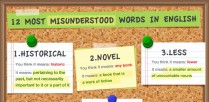I know that this is a very easy subject, but it should be learnt. One of my intermediate students asked about this rule, and today I will explain this on my website.
You may use “yes” and “no” to answer any question you want, but this will be correct enough to speak to your close friends. To answer the questions of other people, you should make one more effort.
1) In most cases we use the verb “to do” to ask questions.
In short answers, we also will use the verb that was mentioned in the question.
Do you remember this answer “I do” from all the love stories? First they ask a couple of questions:
- Do you promise to love her, provide for her, and be faithful to her as long as you both shall live? – I do.
- Do you take (here is the name of your fiancé) to be your husband? – I do.
- Do you take (here is the name of your fiancée) as your wedded wife, to share your life with her? – I do.
Or other questions and short answers.
- Did you do you homework? – Yes, I did.
- Do you play violin every day? – No, I don’t.
- Does he like the play? – Yes, he does.
- Do they know her? – Yes, they do.
2) With other auxiliary verbs, we do not use “do.” We use the auxiliary verbs that we had in the question:
- Can you play the piano? – Yes, I can.
- Are you playing the violin tomorrow? – Yes, I am.
- Will she be here in time? – Sure, she will.
- Have you lost your key? – Yes, I have.
3) We use the short questions/answers to show our astonishment or agreement:
- Samuel and Nadine are getting married. – Are they? (We are surprised.)
- It snowed every day there. – Did it? (We are surprised, and we want to feel for the speaker.)
- I am tired. – So am I. (I am tired too. I agree with you or your feelings.)
3.1) We can use negative short answers:
- I don’t know his name. – Neither do I.
- You can’t meet him at the station. Not can I.
- They don’t like coffee. Neither does she.
4) I guess that the following thing is possible in your native languages too: accept or disagree using the words of feeling (I hope so, I think so, I suppose so, I expect so, I’m afraid so).
- Does he speak Spanish? – I hope so. (I don’t know, but I hope he speaks Spanish.)
- Do they dislike tea? – I’m afraid so. (We made some tea, but our guests don’t drink it. I am afraid they dislike tea.)
- Are they afraid of dogs? – I hope not. (I have got two dogs, and I hope that my guests are not afraid of dogs.)
- Does she like flowers? – I don’t think so. (I gave her flowers once; she did not like this gift.)
Find out the homework for this lesson here.






